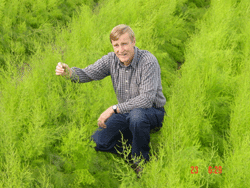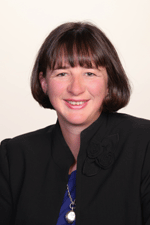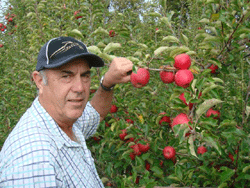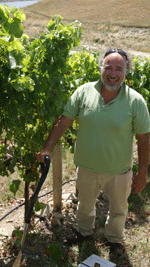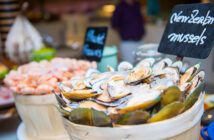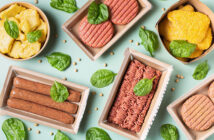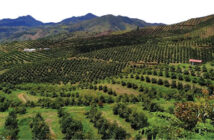By Les Watkins
Identity theft in the food and beverage industry is more widespread than previously believed. The latest to be found out is Simon Mickleson who used fake labels to transform ordinary wines into vintages supposedly worth $1.3 million. The hunt for a solution often leads to the door of Oritain chief executive Helen Darling.
Asparagus specialist Dr Peter Falloon typifies a growing band of Kiwis fighting fraudsters who, in addition to robbing food producers of billions of dollars annually worldwide, are helping to sabotage the excellent international reputation of New Zealand.
Dr Falloon is the managing director of Aspara Pacific, this country’s only asparagus seed breeder. He has spent 20 years developing cultivars highly-regarded around the world.
But success has made him and other leading New Zealand producers vulnerable to counterfeiters, eager to exploit their reputation, who the OECD estimates are making illegal profits of more than US$250 billion a year and growing.
“We export our seed to many countries including the US, Japan and South Africa. For years, even in the US, there have been a lot of questionable dealings with vegetable seeds,” says Dr Falloon whose base is at Lincoln, near Christchurch.
“Inferior F2 seed, which generally gives a yield of 20 to 30 percent less than our F1, is either deliberately wrongly labelled or mixed with top-quality seed.
“Growers can’t tell the difference. They tend to look at the price, go for what seems the best buy, and eventually of course, they are disappointed. That has the potential to do us tremendous harm so we decided to be pro-active – and took steps to protect ourselves.”
That led him to pioneering foodverification company Oritain Holdings of Dunedin which scientifically identifies the ‘fingerprints’ of products – including those of meat, milk, fruit and vegetables, which are created by their source of origin.
Oritain chief executive Dr Helen Darling explains: “All animals and plants absorb the natural properties of their environment. The adage about being what you eat is true of most natural products. Each absorbs the characteristics of the soil, water and vegetation that nourishes them and those characteristics provide our ‘fingerprint’.
“The isotopic composition of rainfall varies from area to area because of environmental differences and factors such as distance from the coast. So distinct differences can be identified between the rain in Central Otago, for instance, and that in Waikato. The soils also have variations in their trace elements which again enable us to establish a product’s origin.
“The counterfeiters use all sorts of tricks – copying genuine labels, re-packaging consignments and so on – but what they cannot do is accurately copy that fingerprint. That can’t be tampered with because it is right there in the product.
“So if counterfeiting is suspected, as has often been the case with products from this country, we can prove whether or not they are the genuine article.
“This is becoming increasingly important because brand New Zealand is worth a lot – being regarded as superior in terms of production, safety and quality.
“Top brands – watches, handbags, apples or whatever – are always targets for counterfeiters and, particularly in times of economic hardship, counterfeiting is a growth industry.”
Falloon discovered that truth in February. A nursery in England was caught selling a variety of seeds which, the management claimed, were from New Zealand.
“But we’re the world’s only producers of that variety and, although they were giving customers all sorts of information about New Zealand, we’d never supplied them,” he says.
“Neither had our agent. Our agent is now talking to them and hopefully the matter will be sorted. But if it becomes a big issue we’ll send some of its seed to Oritain and, if necessary, use the findings as evidence in court.”
The Taylor Corporation of Hawkes Bay, one of the world’s largest apple producers exporting more than a million cartons a year, called in Oritain about four years ago after a false accusation over a consignment being sold in Germany.
Their apples, it was claimed, bore excessive residues of pesticide.
“We knew that couldn’t possibly be right because we didn’t use that chemical,” says chief executive Kelvin Taylor.
“But they insisted because the apples, they said, had come out of our box. Our fruit is regarded as pretty top-of-the-line and it seems that someone had put cheaper apples in a box which they then stuck our name on to get a better price.
“That was why we got involved with Oritain and traceability. This sort of thing keeps on happening. You can see our fruit – or apparently our fruit – being sold all over China in boxes. If that’s what the store wants that’s what it’ll get – even if the seller has to make the boxes overnight.
“So we regard Oritain rather like fire insurance on a house. We can’t be without it because there’s so much cheating going on that overseas importers are going to want product that is totally traceable. We’re able to guarantee that our apples have not only come from New Zealand but from a particular block in New Zealand.”
The diverse range of producers using the Oritain service includes award-winning winemaker Antonio Pasquale who launched his operation in South Canterbury after emigrating 27 years ago from Italy. He decided to get the Oritain accreditation in 2008 because he is passionately protective about the wine from his vineyards in Hakataramea and the Waitaki Valley.
“I was alarmed to discover the dirty tricks which are common in old world are also played here,” he says.
“There was a hell of a lot of bad wine coming in from Chile and being sold as New Zealand wine. And wine that’s not up to standard can be secretly improved by adding 15 or 20 percent of something better – without saying where that comes from.
“But inever taint my wine in any way – never add anything to lift the taste. That’s why, to make sure no cheats are using my name and reputation, it is important for the fingerprint of my wines to be on record.”
Ms Darling and her team were also commissioned by the government to help confirm that a shipment of contaminated beef in Belgium was not – as was being alleged – a product of New Zealand. This country’s beef producers were exonerated and saved from the danger of being blacklisted in the EU.
“That was in 2008 and losing that market would have been devastating because it was such an important one for our meat exports which were worth a total of US$3.6 billion that year,” says Ms Darling.
For more information:
Dr Helen Darling
Tel: 03 464 0888
Visit: www.oritain.co.nz


























































































